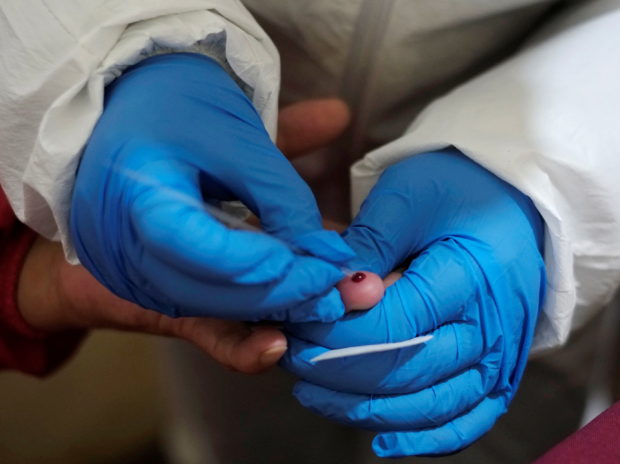Risk of dangerous blood clots linked to moderate COVID-19; high-dose blood thinner can prevent clots

FILE PHOTO: A medical worker takes a blood sample from a saleswoman during a voluntary rapid antigen testing campaign for the coronavirus disease (COVID-19) at the Sopocachi market in La Paz, Bolivia, December 26, 2020. REUTERS/David Mercado
A European study has found an elevated risk of a life-threatening blood clot called venous thromboembolism (VTE) in COVID-19 patients who were not critically ill.
The blood clot risk had previously been associated with severe COVID-19.
The researchers tracked 2,292 patients who came to hospital emergency rooms with mild or moderate COVID-19 but without VTE.
Four weeks later, VTE had developed in roughly 1 of every 200 mildly ill patients who had not been hospitalized and nearly 5 of every 200 moderately ill patients overall, the researchers reported on Friday in Thrombosis Research. They conclude that doctors caring for mildly and moderately ill COVID-19 patients need to be aware of these risks, “especially in patients with moderate COVID-19 requiring hospitalization.”
High-dose blood thinners prevent clots in moderate COVID-19
Article continues after this advertisementIn hospitalized, moderately ill COVID-19 patients who have high levels of the d-dimer protein in their blood – indicating a higher-than-average risk for dangerous blood clots – treatment with high doses of the blood thinner low-molecular weight heparin (LMWH) significantly reduced the odds of clot formation and death, according to data from a clinical trial.
Article continues after this advertisementThe incidence of venous thromboembolism (VTE) or death was 28.7% in the high-dose group, compared to 41.9% in patients getting a standard dose.
After accounting for patients’ various risk factors, that was a 32% reduction in risk with high-dose heparin, the researchers said on Monday in a report published in JAMA Internal Medicine.
The researchers said they launched the trial “because we saw patients getting blood clots and dying in front of us while on standard doses of preventative heparin,” said study leader Dr. Alex Spyropoulos of the Feinstein Institutes for Medical Research in New York.
“We were able to prove … that d-dimer levels more than four times the upper limit of normal are able to predict a very high-risk group of hospitalized COVID-19 patients – and giving therapeutic doses of heparin in these patients works,” Spyropoulos said. “This is practice changing now.”